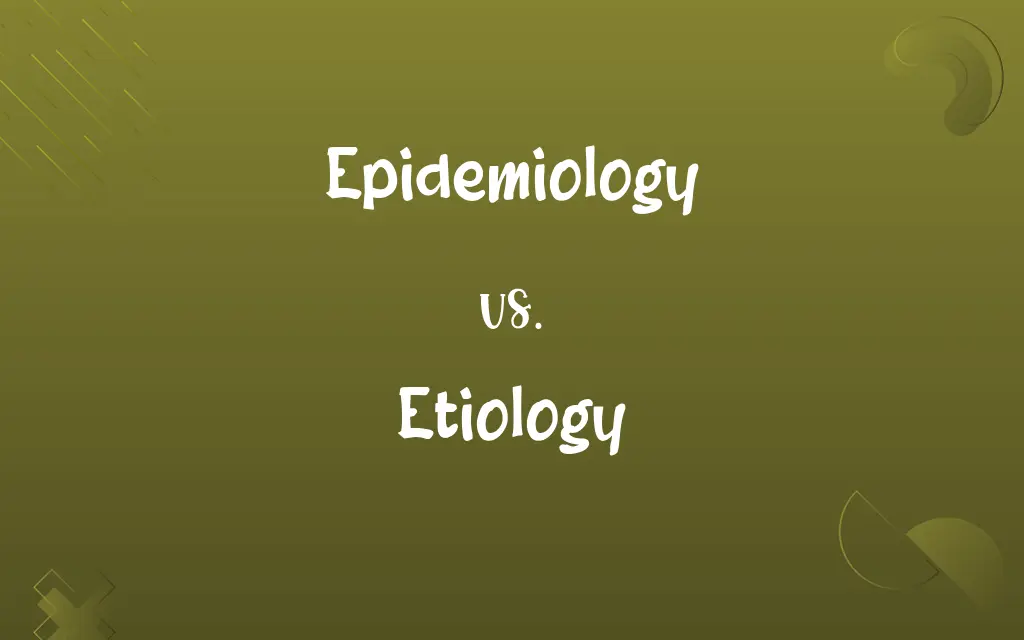Epidemiology vs. Etiology: Know the Difference

By Shumaila Saeed || Published on February 6, 2024
Epidemiology is the study of disease distribution and patterns in populations, while etiology focuses on the causes and origins of diseases.

Key Differences
Epidemiology is primarily concerned with the patterns, frequency, and control of diseases within populations. It involves the analysis of data to understand how diseases spread and how they can be managed on a larger scale. Etiology, on the other hand, delves into the specific causes of diseases, seeking to understand the factors and reasons behind the occurrence of a particular disease. Both fields are crucial in public health but focus on different aspects of disease understanding.
Shumaila Saeed
Feb 06, 2024
While epidemiology often uses statistical methods to study diseases in groups of people, etiology is more concerned with the biological and environmental factors leading to a disease. Epidemiologists may study how and where a disease is most prevalent, identifying risk factors and patterns. In contrast, etiologists aim to uncover the root causes of diseases, which can be genetic, microbial, environmental, or a combination of these.
Shumaila Saeed
Feb 06, 2024
Epidemiology plays a key role in formulating public health policies by providing essential data about the spread and impact of diseases. This field helps in identifying population groups at higher risk and measures to control the spread. Etiology, conversely, informs the understanding of disease mechanisms and pathways, which is fundamental in developing treatments and preventive strategies. Both are interrelated but serve distinct purposes in the realm of healthcare.
Shumaila Saeed
Feb 06, 2024
Another key difference lies in the approach. Epidemiology often works with large-scale data, observing trends over time and across different geographic locations. It's more about the 'what' and 'when' of disease patterns. Etiology, however, is more focused on the 'why' and 'how', investigating the underlying causes and mechanisms of diseases at a more microscopic level. Both perspectives are vital for a comprehensive understanding of health and disease.
Shumaila Saeed
Feb 06, 2024
In summary, while epidemiology and etiology are both essential in understanding diseases, their approaches and focuses differ significantly. Epidemiology provides a macroscopic view of disease patterns and trends, crucial for public health planning and disease control. Etiology, in contrast, offers a microscopic perspective, uncovering the specific causes and mechanisms behind diseases, essential for treatment and prevention strategies.
Shumaila Saeed
Feb 06, 2024
ADVERTISEMENT
Comparison Chart
Primary Focus
Distribution and patterns of diseases in populations
Causes and origins of diseases
Shumaila Saeed
Feb 06, 2024
Methodology
Statistical analysis of population data
Investigation of biological, genetic, and environmental factors
Shumaila Saeed
Feb 06, 2024
Purpose
To identify risk factors and inform public health strategies
To understand disease mechanisms for treatment and prevention
Shumaila Saeed
Feb 06, 2024
Scope
Broad, population-level perspective
Focused, individual-level understanding of disease causes
Shumaila Saeed
Feb 06, 2024
Outcome
Guides public health policy and disease control measures
Informs development of medical treatments and preventive methods
Shumaila Saeed
Feb 06, 2024
ADVERTISEMENT
Epidemiology and Etiology Definitions
Epidemiology
The analysis of the distribution and determinants of health-related events in specific populations.
Through epidemiology, scientists identified smoking as a major risk factor for lung cancer.
Shumaila Saeed
Jan 24, 2024
Etiology
The branch of medicine that deals with the causation of diseases.
Understanding the etiology of cancer is key to developing effective treatments.
Shumaila Saeed
Jan 24, 2024
Epidemiology
A field focusing on the incidence, prevalence, and control of diseases.
Epidemiology plays a crucial role in developing strategies for disease prevention.
Shumaila Saeed
Jan 24, 2024
Etiology
The study of the causes or origins of diseases.
The etiology of diabetes involves both genetic and environmental factors.
Shumaila Saeed
Jan 24, 2024
Epidemiology
The study of the frequency and distribution of disease and health outcomes within a population.
Epidemiological data showed an increase in heart disease in the area.
Shumaila Saeed
Jan 24, 2024
ADVERTISEMENT
Etiology
The investigation into the factors contributing to the occurrence of a disease or condition.
Researchers are examining the etiology of Alzheimer's disease.
Shumaila Saeed
Jan 24, 2024
Epidemiology
The study of how diseases spread and affect populations.
Epidemiology helped trace the source of the outbreak to contaminated water.
Shumaila Saeed
Jan 24, 2024
Etiology
The scientific study of the reasons or causes behind the development of diseases.
Etiology helps to uncover why certain individuals are more prone to specific illnesses.
Shumaila Saeed
Jan 24, 2024
Epidemiology
The science that examines the patterns, causes, and effects of health and disease conditions in defined populations.
Epidemiologists are tracking the spread of the flu to predict future outbreaks.
Shumaila Saeed
Jan 24, 2024
Etiology
The analysis of disease causes and risk factors.
Studying the etiology of infectious diseases helps in creating better vaccines.
Shumaila Saeed
Jan 24, 2024
Epidemiology
The branch of medicine that deals with the study of the causes, distribution, and control of disease in populations.
Shumaila Saeed
Jan 14, 2024
Epidemiology
(sciences) The branch of science dealing with the spread and control of diseases, viruses, concepts etc. throughout populations or systems.
Shumaila Saeed
Jan 14, 2024
Etiology
The branch of medicine that deals with the causes or origins of disease.
Shumaila Saeed
Jan 14, 2024
Epidemiology
(sciences) The epidemiological body of knowledge about a particular thing.
Shumaila Saeed
Jan 14, 2024
Epidemiology
That branch of medicine which studies the incidence and distribution of disease in a population, and uses such information to find the causes, modes of transmission, and methods for control of disease.
Shumaila Saeed
Jan 14, 2024
Etiology
The cause or origin of a disease or disorder as determined by medical diagnosis.
Shumaila Saeed
Jan 14, 2024
Epidemiology
The branch of medical science dealing with the transmission and control of disease
Shumaila Saeed
Jan 14, 2024
Repeatedly Asked Queries
What is epidemiology?
The study of disease distribution and patterns in populations.
Shumaila Saeed
Feb 06, 2024
What does an epidemiologist do?
Analyzes data to understand disease spread and inform public health policies.
Shumaila Saeed
Feb 06, 2024
Is epidemiology only about infectious diseases?
No, it also studies non-infectious diseases and health conditions.
Shumaila Saeed
Feb 06, 2024
Can epidemiology predict disease outbreaks?
Yes, it can help forecast outbreaks by analyzing trends.
Shumaila Saeed
Feb 06, 2024
How does etiology contribute to medicine?
It helps in understanding disease mechanisms for treatment development.
Shumaila Saeed
Feb 06, 2024
Can etiology determine genetic factors in disease?
Yes, it investigates genetic and other factors in disease causation.
Shumaila Saeed
Feb 06, 2024
Is etiology important for preventive healthcare?
Yes, understanding causes is crucial for disease prevention.
Shumaila Saeed
Feb 06, 2024
Does epidemiology involve field research?
Yes, it often includes field studies and data collection.
Shumaila Saeed
Feb 06, 2024
How does epidemiology impact public health?
It identifies risk factors and informs disease control strategies.
Shumaila Saeed
Feb 06, 2024
What role does etiology play in diagnosis?
It aids in identifying the underlying causes of symptoms.
Shumaila Saeed
Feb 06, 2024
How does epidemiology use statistics?
It uses statistical methods to analyze health data of populations.
Shumaila Saeed
Feb 06, 2024
What is the difference between epidemiology and etiology?
Epidemiology studies disease patterns, while etiology focuses on causes.
Shumaila Saeed
Feb 06, 2024
Can epidemiology help in emergency response?
Yes, it guides responses to health crises and epidemics.
Shumaila Saeed
Feb 06, 2024
Can etiology inform public health policy?
Yes, by understanding disease causes, it can guide policy.
Shumaila Saeed
Feb 06, 2024
Do epidemiologists work with other health professionals?
Yes, they collaborate with various healthcare experts.
Shumaila Saeed
Feb 06, 2024
Is etiology relevant for chronic diseases?
Absolutely, it's crucial for understanding long-term conditions.
Shumaila Saeed
Feb 06, 2024
Can etiology include environmental factors?
Yes, it looks at all possible causes, including environmental.
Shumaila Saeed
Feb 06, 2024
How do epidemiology and etiology complement each other?
Epidemiology identifies patterns, etiology explains them.
Shumaila Saeed
Feb 06, 2024
Are epidemiology and etiology evolving fields?
Yes, both continuously evolve with new research and technology.
Shumaila Saeed
Feb 06, 2024
Share this page
Link for your blog / website
HTML
Link to share via messenger
About Author
Written by
Shumaila SaeedShumaila Saeed, an expert content creator with 6 years of experience, specializes in distilling complex topics into easily digestible comparisons, shining a light on the nuances that both inform and educate readers with clarity and accuracy.








































































